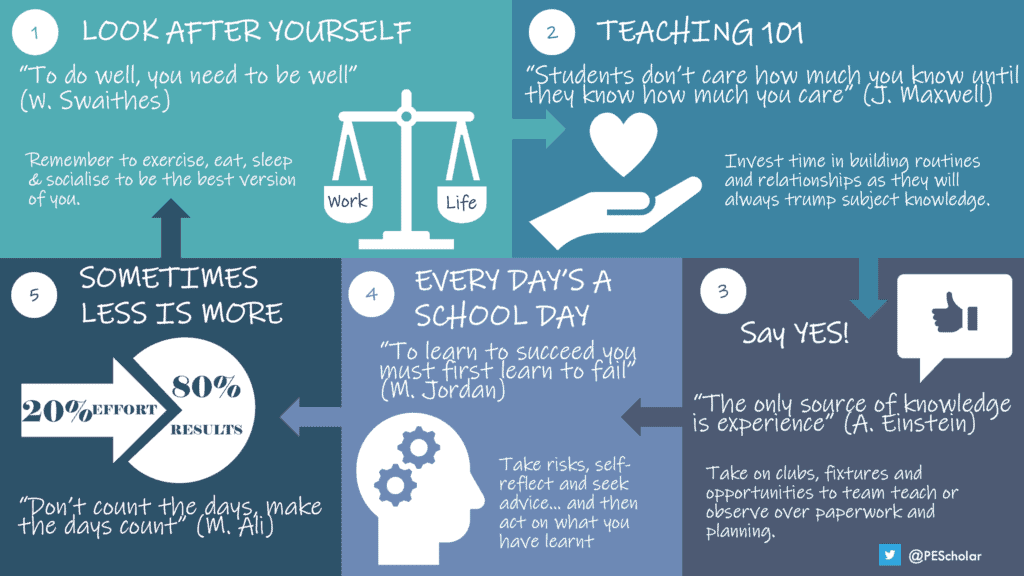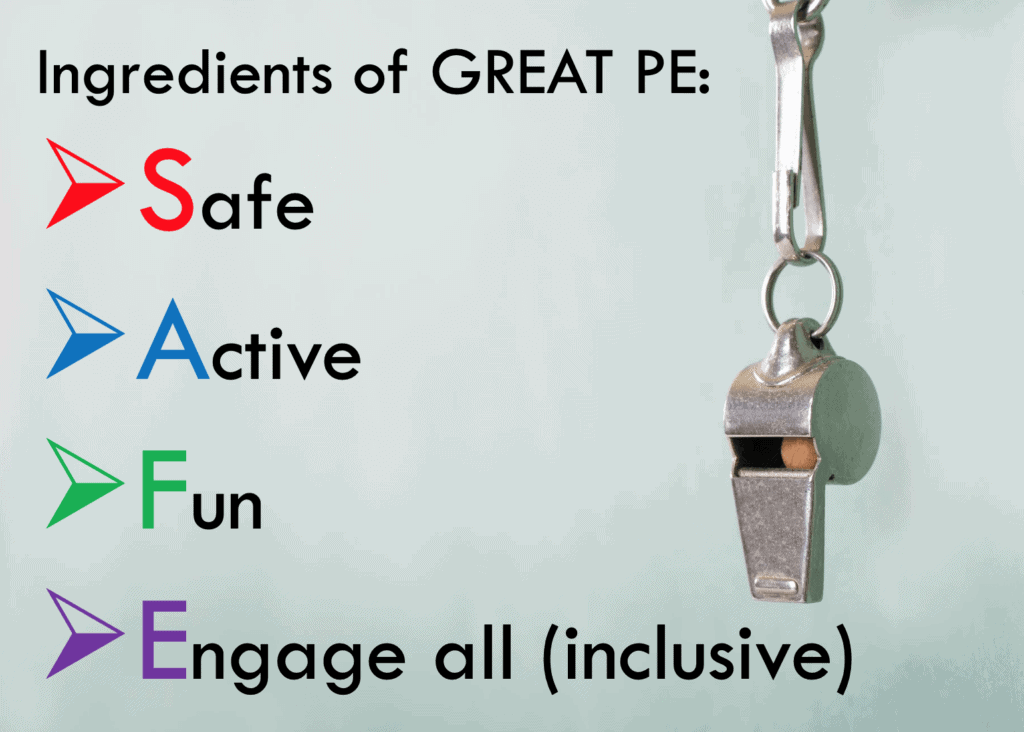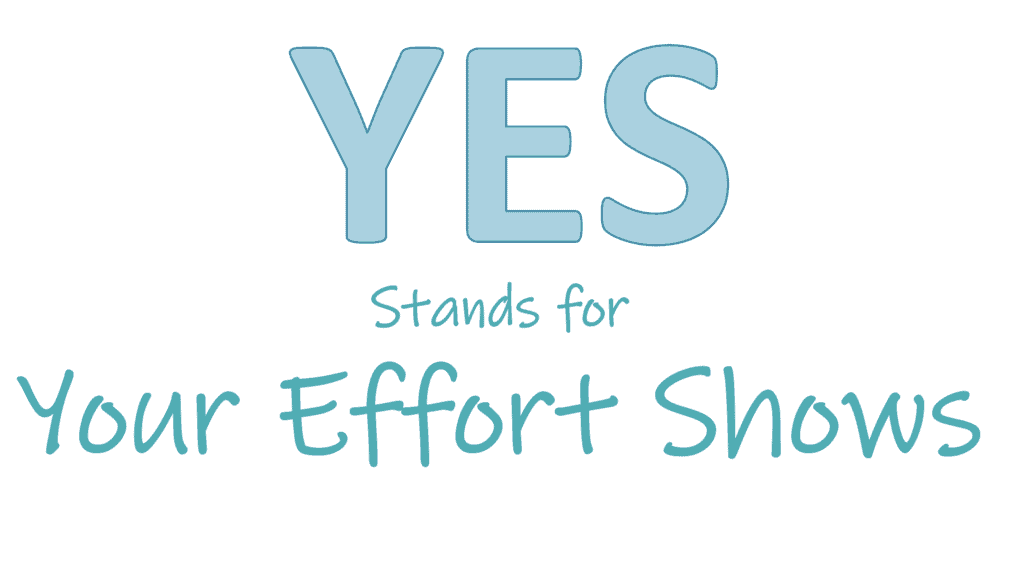
This is a must read for all Physical Education trainees. These top tips will help you make the most of your training year!
Teaching physical education is a highly rewarding profession, but it is not easy. Just when you think you have got to grips with things, one small element changes and suddenly everything that you thought you knew has changed as well. Whoever said those ‘who can, do. Those who can’t, teach. And those who can’t teach, teach PE’ is wrong! Fact.
As you start your career long learning journey, perhaps the most important thing to remember is to enjoy the process. As someone famous once said, “nothing worth having comes easy” and this promises to be a rollercoaster year of pressure, possibility and managing priorities.
Here are 5 top tips for thriving rather than just surviving your training year and starting to refine your craft as a physical educator:
-
Look after yourself
When Sebastian Coe was co-ordinating our efforts to host London 2012, a journalist once suggested that he must be missing his running. Coe was quick to correct the journalist and remark on how the pressure and dedication required by the role of chairman for the London Organising Committee meant he had never needed his running more. It was his time and space to clear his head but also regularly the place where his best thinking happened.
“To be a good [teacher], you need to take care of yourself so that you can have the physical and emotional energy to take care of your [students].” Michelle Obama once famously said this, ok she actually said [parents] and [family] respectively but it amounts to the the same thing! Make sure you invest in yourself and whatever you need to rest and recover. Remember to exercise, eat, sleep, socialise and whatever else helps ensure you are the best version of yourself to be relaxed, positive and ready to step into the classroom, sports hall, gym or field. This is perhaps less about that famous work: life balance but more about ensuring you carve out quality time for school and for home life.
Meanwhile, don’t try to imitate another teacher’s style but instead invest in discovering, and then being, the teacher you want to be. Play to your own individual strengths and utilise your unique personality to connect with your students.
-
Teaching 101: Routines and relationships trump subject knowledge every time.
Especially for trainee PE teachers, the biggest worry always seems to be the activity areas or aspects of the curriculum/ specification that you have least experience and hence confidence in. However, “students don’t care how much you know until they know how much you care” (John Maxwell), building rapport and lesson routines is actually a far more influential factor affecting teacher competence.
In fact, some of the best lessons I have seen taught by physical education trainees over the past few years have been in areas well outside their personal comfort zone. Invest time in routines and approaches to teaching that place the students at the centre of learning and worry far less about whether you know every intricacy of technique or nuance to the rules of a particular game or activity. Make time to learn about individual students and what matters to them – there is plenty of informal time for this within a PE lesson (when changing, moving to activity spaces, waiting for the whole group to assemble and whilst others are on task and active) but I challenge you to reach outside the lesson time and see the effects of:
- Seeking out a student or group of students before a lesson to connect them with intended learning and offer an opportunity to input into planning
- Finding disengaged or disruptive students after a lesson – during break, tutor time or even better in another subject to ask why they think the lesson didn’t go to plan, what they think you could do differently next time and help them understand how it made you feel
- Phone home – try to end every day with at least one positive phone call home. They say ‘catch them doing something right’ and provide praise but that praise goes even further if it can be reinforced at home, especially for parents who are only used to receiving a call from school to say something is wrong!

Meanwhile, build a strong foundation of the four ingredients that unlock great PE. Plan and carefully consider how you can balance safety and fun in every lesson whilst also ensuring all students are fully engaged and active. To do this you will need to step back and observe. At least ever five minutes I recommend spending 30 seconds or more on the periphery soaking up what is happening, common misconceptions and where your next input will have biggest impact on learning. That may actually mean doing nothing and just letting them continue practicing and supporting each other.
-
Say yes! Get involved in everything.
Finding ways to ‘work smarter not harder’ will result in greater progress as a teacher. So many physical education trainees bury themselves in paperwork and planning on their laptops at the cost of missing the opportunity to learn through doing. As Albert Einstein once said, “the only source of knowledge is experience” and consequently you should grab every opportunity to observe; to team teach; to run clubs, teams and fixtures; and to hone your skills as a practitioner. Never again will you get so much time or opportunity to see other teachers in action, both within and beyond PE.

It is rewarding to share your strengths, for example starting a new Gaelic football club if that is your area of expertise, but it is equally valuable to get extra practice time at things you are perhaps less confident with and in front of a more forgiving audience at a club or in someone else’s lesson… for me that was always dance, gymnastics and TPSR (teaching personal and social responsibility).
-
Every day’s a school day.
Never has this phrase been more true and this doesn’t stop at the end of your training year. To be a great teacher it is essential to be willing to fail – see it as the ‘first attempt in learning’ in the same way you encourage your students to get into practice mode rather than performance mode. Take risks, self-reflect and seek advice … and then make sure you act on what you learn. The very best teachers are those who can accurately critique their own lessons and unpick the underlying causes of different issues (e.g. low-level disruption) rather than just the symptom. In time you will be able to adapt your teaching on the fly to avoid situations escalating, missed opportunities and the frustrations of hindsight but for now be content to learn and modify for future lessons – remembering that what works one day or with one group might not work the next! As Michael Jordan said, “I’ve missed more than 9,000 shots in my career. I’ve lost almost 300 games. 26 times I’ve been trusted to take the game winning shot and missed. I’ve failed over and over and over again in my life. And that is why ii succeed”.

-
Sometimes less is more
Like this blog, less is sometimes more. Invest time where it matters most. Remember the Pareto principle, 20% of your efforts will give you 80% of your results. Be efficient and work smart to include not trying to plan or do too much in an individual lesson which leaves you short on time to respond to the needs of the group and reflect on learning gains/ successes together. The plenary, or as I like to call it DIRT (dedicated improvement and reflection time) is the most valuable aspect of any lesson if you really want to embed learning and motivate students to come back hungry for more. Help them see what and how they have improved, reflect on what they could have done better and why they should be motivated to practice more by showing them the next steps in their learning journey and highlighting the value of where they are going.

Meanwhile, Muhammad Ali gave sound advice: “Don’t count the days, make the days count.” Your training year will be over before you know it so think carefully about what you want to gain, what you will give to others and what goals you have that focus on the process not just QTS. Focus on the things that you can’t do (yet) by investing time and energy where it will have the greatest impact.

If you are a Physical Education trainee and would like to talk to our team of experienced physical educators please get in touch!


[…] Top 5 tips for PE trainees […]